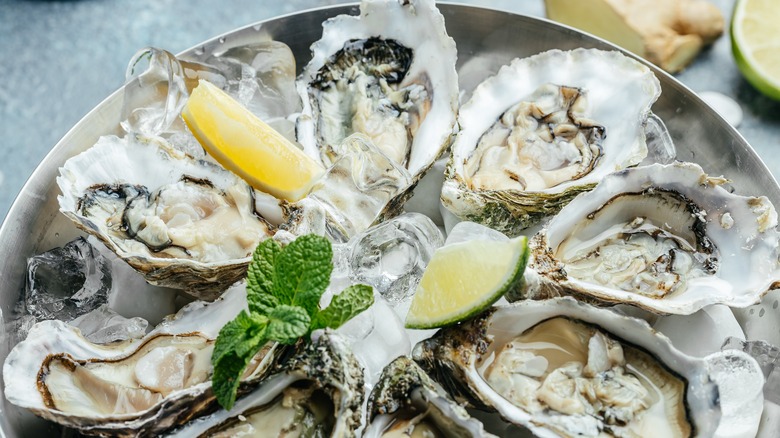The Scientific Reason Frozen Oysters Are A Massive L
If you are a bivalve enthusiast you have probably heard about the 'R' rule for advising when to eat oysters, which designates that you should only consume oysters in the months that contain said letter (September-April) and avoid them during the rest of the calendar year. One scientific analysis even found archeological evidence indicating that adherents of the rule may date as far back as 4,000 years (via Florida Museum of Natural History).
This typically had to do with the warm weather and the heat making oysters spoil quicker in the summer months so that they became unsafe to eat. Well, times have changed, and in addition to refrigeration we now have oyster farming, sustainable harvesting, and stringent food safety oversight to thank for being able to purchase and enjoy delicious oysters year round (per Chesapeake Bay Program).
The biggest question then becomes in what condition do you buy them. Obviously, you want to purchase oysters fresh whenever possible, but is it okay to bring home frozen oysters? Science would tell you this may not be the best approach.
Frozen oysters could be a raw deal for your taste buds
While oysters can be frozen and safely consumed under certain circumstances, there are two primary concerns with freezing that can impact the experience. When oysters are thawed they need to be cooked and should not be eaten raw (via Interstate Shellfish Sanitation Conference). There was even a recall in fall 2022 of Dai One Food frozen half shell oysters from South Korea after at least one person became ill with a virus believed to be linked to the product (per CBS News). The FDA advises proper handling with frozen seafood including avoiding buying packages that might be torn or opened or those that contain ice crystals or frost, a sign that they've been around for a while and might pose a potential threat of food poisoning.
Additionally, freezing oysters can alter their flavor so that it tastes a little more fishy, and the texture can turn softer and become mushy, affecting how you can use them (via canyoufreezethis.com). The National Center for Home Food Preservation cautions that you should only freeze oysters still in the shell live. Due to the change in texture freezing may cause, they recommend serving frozen oysters that have been thawed and cooked in dishes such as stews and casseroles.

